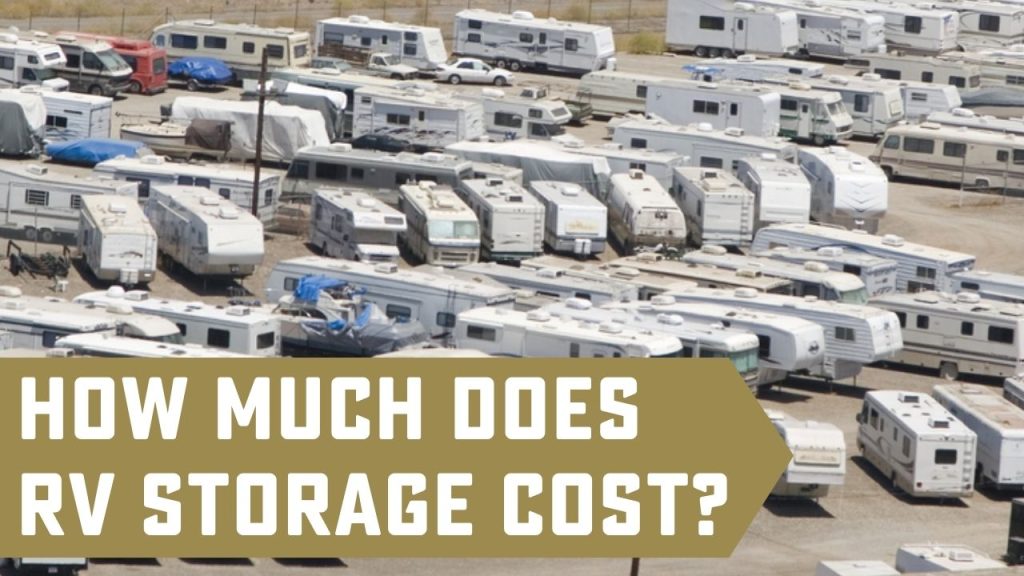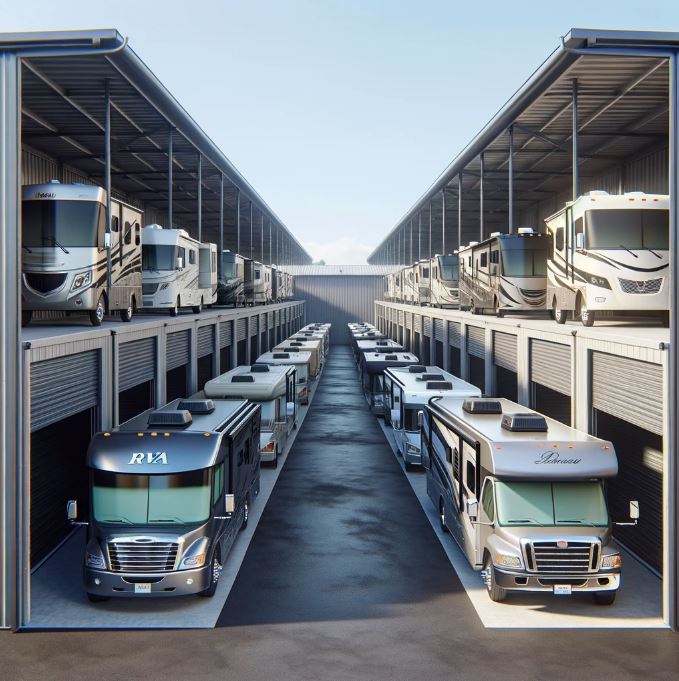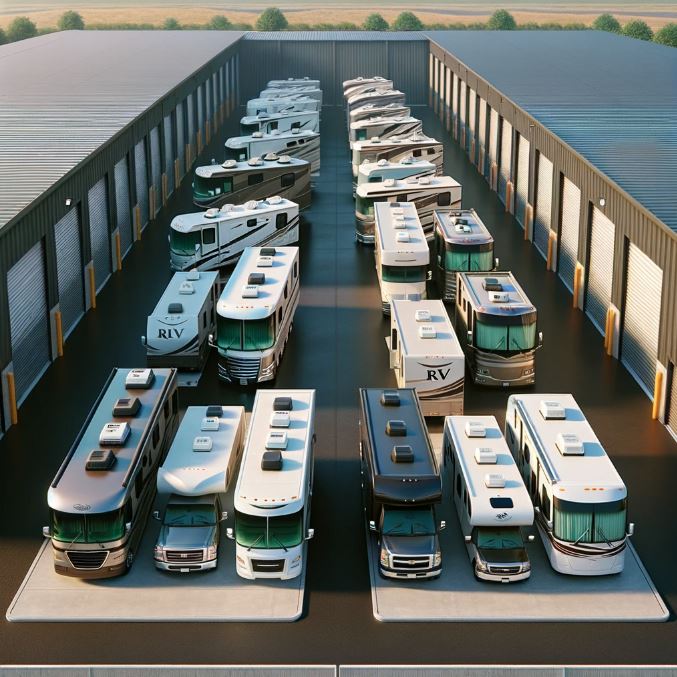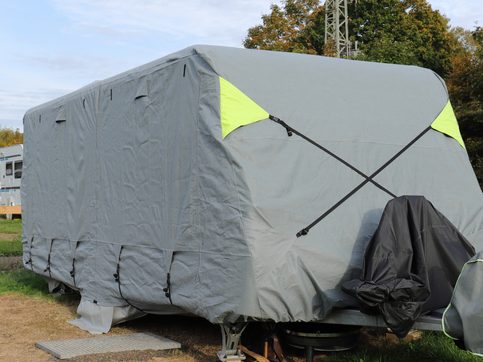Updated Jan 2024
There’s a lot to consider when you buy an RV. If you’re thinking about buying or ready to buy you may be asking, “How much does RV storage cost?”.
Where you store your camper can increase or decrease its longevity and resale value. We would hate for your camper to be totaled out in a storm because you didn’t take the right precaution to protect your camper from the elements.
We don’t have a perfect one size fits all answer for the price of RV storage, but here you will find a price range and the factors you need to consider when you evaluate what storage will cost for your RV.

Table of Contents
What Does RV Storage Cost Per Month?
You’ll pay anywhere from $50 to $500 per month to store your camper at an RV storage facility.
Whether your camper is stored inside or outside and the number of options and/or features available at the storage space will influence your monthly cost.
The price of RV storage factors into your overall cost of RV Ownership.
What Makes RV Storage More or Less Expensive?
Inside or Outside Storage
Indoor storage has more overhead costs, so it will be more expensive than outdoor storage.
In fact, for no extra cost (unless you’ve got to pay a landlord, roommate, homeowner, etc. rent to store the RV on the property), you can park the RV in your backyard or driveway and keep it there until you have use for it.
If you live somewhere with predictable, calm weather, like California, storing your RV on your property may be a great route.
But, outdoor storage still takes up space and can leave your camper at risk.

Mother Nature is a kind, gentle soul who brings forth vibrancy and bliss in her natural beauty, but is also unpredictable, turbulent, and destructive like a two year old holding a sharpie at times. This is why we recommend paying extra to protect your RV with indoor storage if you live somewhere a little more unpredictable, like tornado alley.
Many of our customers’ campers were totaled out and torn apart from storms that formed suddenly – we don’t want that for you!
(image on left generated with AI and is not an accurate representation of how RVs are stored)
You could also consider covered storage, as a compromise. Your RV will still be outdoors, but have an overhead cover to protect it from the elements like sun, rain, and snow. This doesn’t protect the RV completely, like totally indoor storage would.
Covered storage will generally cost you more than outside, uncovered storage, but is less expensive than indoor storage. You’ll want to make sure you do what you can to protect your roof while it’s on its “extended stay”.
Location
If you live in an area where there is a high demand for RV storage but a low supply, you will have to pay more than someone who lives in an area where the demand is low and storage easier to find.
If you live in an area where the cost of living or land prices are higher, your RV storage costs will be higher. Someone in California will likely have to spend more money on RV storage than someone who lives in Texas, for example.
Here is a real-world example of how storage costs vary from location to location, even when paying for the same amount of space and type of storage.
In Altamonte Springs, FL, the average cost for RV storage is $240 per month.
In Omaha, NE, the average cost for RV storage is $164 per month.
RV Size
The more space your RV takes up, the more money you will have to pay for storage. If you own a large 40-foot fifth wheel, you should expect to pay more to store your RV than someone who owns a small travel trailer.
RV Storage Features
Many RV storage spaces offer features like a dump station, wash area, electricity, water, trash service, battery charging, etc.
These services will also influence the cost of storage. Most are not essential for storing your RV, since you will not be using these features while your RV is in storage. If you are a frequent camper and go camping multiple times per month, consider which options you want and which you can pass on, because the extras will cost you.

RV Storage Tips
We recommend these tips when you’re putting your RV into storage. These tips can prolong the life of some of your RV’s accessories, even if you’re using the RV frequently.
Use Your Battery Disconnect
Unplug the battery disconnect when you aren’t using your RV or are putting it away.
Doing this will keep your batteries from draining and will keep your battery’s power full and healthy.
Run Your Motorhome’s Engine Every Two Weeks
Running your RV’s engine every two weeks will help circulate the fluids in your motorhome that are needed for a healthy engine.
Keep in mind, gas does go bad. If you are putting your motorhome away for a prolonged period of time, you may want to consider using a fuel stabilizer.
Fuel stabilizer is a fluid that provides a protective layer for the fuel in your gas tank. If using this product, make sure you start your motorhome for 5-10 minutes after using it to allow the product to spread.
Empty Your Tanks
Emptying your tanks should be a habit after each camping trip. It will decrease the weight you need to pull back home and will increase your tow vehicle’s gas mileage.
If you are storing your camper for a prolonged period of time, particularly in preparation for the winter, you need to winterize your camper!
Cover Your RV with a Tarp

If you plan to store your RV outside, you’ll want to, at very least, cover your camper with a tarp.
Yes, your camper can withstand rain, sun, and snow, but over time, these elements can, and will, harm your camper’s exterior.
Since you spent a lot of your hard-earned money on the camper, it’s worth spending a little more to protect it. A 40″ x 60″ tarp from Tarps Plus costs $169.
Recap
How much an RV costs after you buy it is important to keep in mind. Now you know what kind of costs you may expect to store an RV and how they may change depending on your location and the services you need in your RV storage.
This knowledge will hopefully eliminate any surprise extra ownership costs when you buy your RV.
At Bish’s we want your RV purchase to be transparent and without any painful price surprises. If you have any questions or want to talk to an RV outfitter for guidance, we’d love to help.


